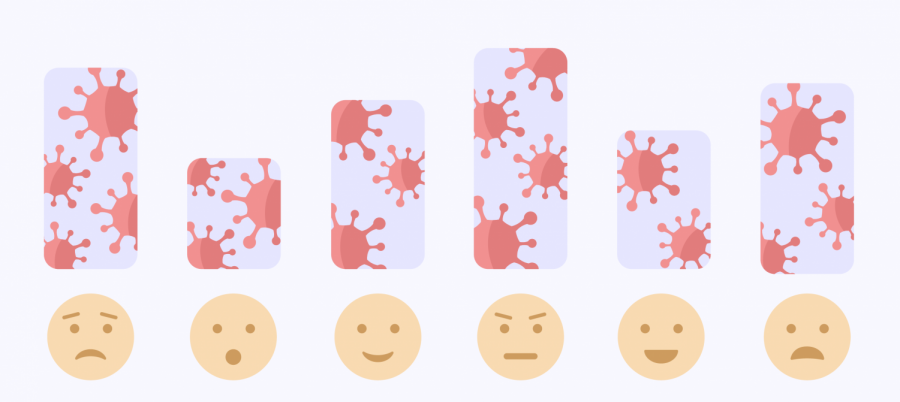Google searches reveal not all feelings that result from COVID-19 policies were negative
March 8, 2021
Bita Fayaz Farkhad, economist and postdoctoral researcher in psychology at the University, along with her fellow researcher Dolores Albarracín, professor in LAS, Medicine and Business, recently conducted and published a study on the mental health implications resulting from COVID-19 mitigation measures.
Farkhad came to Illinois for research after earning her doctoral from Lehigh University in Pennsylvania in 2019. She is now affiliated with the Department of Psychology, where she works with Albarracín in the Social Action Lab. Her main interest is in discovering how different policies affect individual behavior, as well as health-related behavior in general.
Farkhad’s work abruptly shifted focus during the initial coronavirus outbreak.
“Suddenly everything started to be about COVID-19,” she said. “People were really interested in understanding…the actual effects of COVID-19 policies.”
When asked about how she and Albarracín became interested in this specific topic, Farkhad explained that there was much discussion about how much the COVID-19 policies truly reduced the risk of transmission and a lot of evidence indicating that the mitigation measures were “actually quite effective.”
Get The Daily Illini in your inbox!
However, having considered the positives, Farkhad and Albarracín sought to understand whether the policies had any negative effects.
“Especially when you think about a pandemic lockdown, you know, you get negative feelings,” Farkhad said. “You may feel worried or isolated because you no longer have the freedom to go wherever you want to go. And that is what we really wanted to test.”
Due to the unprecedented nature of the pandemic and the unknown duration of the policies, Farkhad admitted she did not quite know what to expect. She suspected there to be negative feelings but also believed in the strength and ability that many people possess to adjust their life to a new situation when facing hardship and restrictions. Therefore, she personally expected the study to reveal findings that were not entirely negative.
The researchers wanted to source the data in an organic way in order to truly understand how people were feeling. They also wanted to be able to measure feelings over a period of time so that they could compare how feelings evolved as policies changed, including during a window of time before any mandates were enacted. Additionally, they needed to take into consideration that different states have had different timelines and levels of restrictions. All of those factors considered, they chose to examine Google searches associated with terms of depression and anxiety, ranging from January 2020 through the end of June.
According to Farkhad, they used the data from online searches to analyze “how trends in searches for negative feelings, state by state, were changing over time and whether the trend was really being affected by the different restrictions — especially measures like stay-at-home orders and restaurant/bar closures.”
From there, they specifically examined the search trends for clues about the extent to which people were experiencing feelings of isolation or depression. A challenge of the study, Farkhad noted, was examining the search data and looking exclusively at the impact of the policies — not the effects of the pandemic as a whole.
“Some people may be feeling bored or depressed, but that may not necessarily be because of the restrictions; it might be because of a financial loss they had due to the pandemic itself or negative feelings about the pandemic in general,” Farkhad said.
After an analysis of the searches they found, Farkhad explained that “interestingly, we saw that the spike (in negative feelings) went away after two to four weeks. People were still under jurisdiction, but we really didn’t see the same pattern of negative feelings (after the four-week period). We also saw that there was an increase in searches for certain positive activities, like exercise, or people really searched a lot for things like cooking.”
The findings indicate that people felt worried immediately after the policy implementation, but soon found different ways to spend their time. People were not able to go to restaurants, but they had more time to cook at home.
“That might be the reason that those negative feelings were much lower after a couple of weeks,” Farkhad said. She also suggested that the positive feelings may have stemmed from the sense of security the policies offered. People could be more certain that their loved ones were safer, especially those with family members living in other countries.
“Certainly, we have all experienced discomfort in some way throughout this pandemic,” Farkhad said.
However, likely to the surprise of many, the results of Farkhad and Albarracín’s study prove that there have been positive effects of the pandemic too.
Kimberly is a senior in LAS.







